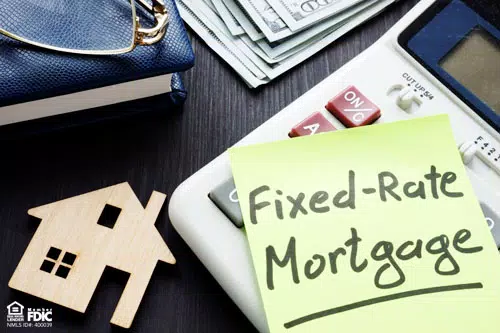When it comes to financing your home, one popular loan option is a fixed-rate mortgage. This type of mortgage holds the same interest rate for the life of the loan, so your monthly interest and principal payment amount will stay the same. If you’re considering a fixed-rate mortgage, here’s everything you need to know.
Their Stability Makes Them Popular
More than 90% of mortgage applications are for fixed-rate loans. This type of financing was launched after the Great Depression to combat foreclosures caused by fast changes in interest rates, common during that time. The predictability of fixed rates allows home buyers to know exactly what to expect from month to month and year to year.
How They Work
With fixed-rate mortgages, the loan is amortized so that both the principal and interest are paid off at the end of the loan term. So, a part of your monthly payment will go towards interest, while the rest pays down the principal. Initially, this means that a more significant portion of your monthly payment will go towards interest than the principal, with the ratio rebalancing over time.
Interest rates on a fixed-rate mortgage tend to be higher than on an adjustable-rate mortgage. The lower rate on an adjustable-rate mortgage is usually fixed for three to seven years, then will change depending on economic factors. (Though usually the interest rate is capped at a certain percentage).
Your Mortgage Choices
There are two main factors to consider when looking at mortgage options: the interest rate and the term. While fixed-rate mortgages and adjustable-rate mortgages are the most common option, there are some others available. Balloon-payment mortgages, interest-only mortgages, pay option mortgages, and negative-amortization mortgages are all possible interest rate choices.
The term of the loan is the length of time that you are selecting to borrow money.
Determining Factors in Your Mortgage Rate
The actual interest rate you receive is primarily based on the following factors:
- Down payment amount. Generally, the more money you put down towards the purchase price, the lower your interest rate.
- Mortgage type. Interest rate ranges are a bit lower for mortgages that are backed by the Federal Housing Administration or the Department of Veterans Affairs.
- Loan term. Lenders perceive a longer-term loan to be riskier than a short-term loan. Therefore, the interest rates on shorter-term loans will tend to be lower.
- Loan size. When a mortgage amount is larger or smaller than the typical size loan, the interest rate tends to be higher.
- Home location. Different regions of the U.S. may have different rates.
- Credit score. Lenders see lower credit scores as higher risk, so interest rates are heavily impacted by your score.
- Interest rate type. Fixed-rate mortgages have higher interest rates than adjustable-rate mortgages, at least during the introductory period.
Advantages and Disadvantages of Fixed-Rate Mortgages
The predictability in payment amount is probably the most significant advantage of a fixed-rate mortgage. Their simplicity also makes them much easier to compare than other options and makes mortgage shopping more straightforward. Since fixed-rate mortgages tend to have longer terms, this leads to lower monthly payments relative to loan size over the life of the loan. This makes it possible to afford and qualify for a bigger loan.
There are some drawbacks to this type of mortgage. If interest rates drop, you won’t be able to cash in on the savings without refinancing your loan. You might end up paying more than on an adjustable-rate mortgage, especially if you’re planning to sell or refinance in a few years. Fixed-rate mortgages also cost more in total interest, particularly on a longer-term loan.
Are you ready to choose a mortgage? Or do you want to talk to an expert about your options? NASB has advisors standing by at 888-661-1982, or click here to get a free rate quote.




